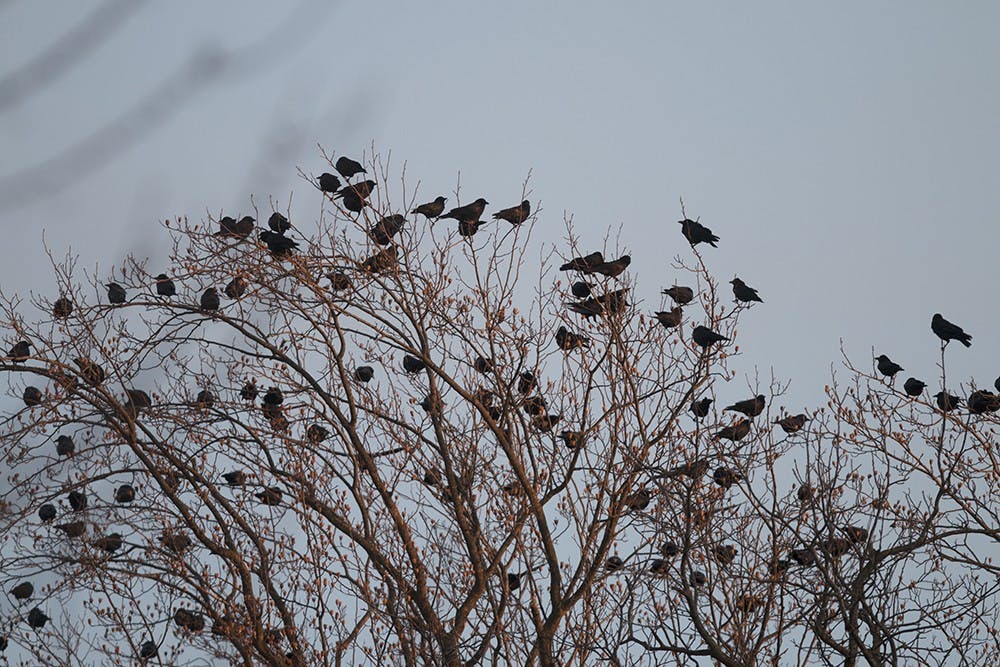Crows.
They flock to the courthouse square at sundown. Cawing, screeching, swooping and, of course, pooping. This winter’s murder has filled trees and covered parking meters since December, and they’re here to stay until the end of breeding season in March, according to IU Public Health Manager Graham McKeen.
“They seem to pick out new spots every season or two,” McKeen said via email. “We’ve had them roost on campus in past years, and I’ve personally noticed them around the courthouse in high numbers this winter.”
McKeen works for IU’s Office of Environmental Health and Safety, which is responsible for inspections, compliance and enforcement for health and safety issues. He said there are a few theories as to why crows tend to hang in out in urban areas, like downtown Bloomington.
“The urban environment provides protection from predators such as owls, as they tend to not inhabit urban environments,” McKeen said. “These areas also tend to have nice big trees, especially in Bloomington as we are a ?‘tree city.’”
For JL Waters employee Sam Wright, the crows are just a huge annoyance.
“It’s intimidating when there’s 100 in a tree right above you,” Wright said. “It’s like walking outside into an Alfred Hitchcock movie.”
Wright keeps a long brush in his truck specifically for the removal of crow excrement from his windshield. His wipers just smear it everywhere, he said.
“We couldn’t remember back when I was a kid having the crow migration be this bad,” Wright said. “Who knows? I guess the crows do.”
Starkey, Wright and other employees on the square try to park in the covered parking garage on Fourth Street so their cars won’t be destroyed by the end of the night. The employees at Grazie Italian Eatery have learned to avoid the courthouse while walking to their cars, or else they’ll be rained on with crow droppings, Starkey said.
“People don’t want to park on the square,” Starkey said. “I wouldn’t blame people for not wanting to come in unless they had an umbrella.”
The employees also said, though the crows annoy customers, sales have not dropped this winter at Grazie or JL Waters.
However, the sound of about 1,000 crows cawing can be heard inside, even from the back of the restaurant, Starkey said.
“You hear them every night,” Starkey said. “Every car gets destroyed. It smells, all the meters are covered. You want to run in here with an umbrella.”
As Bloomington resident Kathy Friend carefully put coins in a parking meter that was plastered with crow droppings, she was not bothered by the mess.
“It’s part of living in the city,” Friend said. “I mean, have you ever been to New York? It is what it is.”
Starkey and Wright said they and their customers worry about the health risks of the crow migration, and wonder what the city plans to do regarding clean up.
Though the fairly minimal health risks from crows tend to be exaggerated, risk increases when large amounts of crows and humans are in the same area, such as Bloomington’s square, McKeen said.
“The accumulation of droppings and feathers could pose a risk of exposure to microorganisms and pathogens,” McKeen said.
The birds could contribute to an increase in exposure to histoplasmosis, a flu-like illness caused by fungal spores found in crow droppings.
“Many who are exposed will never get ill, but people with compromised immune systems or the young or the elderly could get a pretty serious illness,” McKeen said. “Dry areas and conditions can increase the risk of these spores or other pathogens getting into the air and potentially exposing humans.”
The City of Bloomington does power wash the sidewalks around the square and has done it twice so far, according to Susie Johnson, Director of Public Works. Employees can only power wash when it is above freezing.
Monroe County takes responsibility for power washing the interior of the square, though it has only happened a few times, county spokesperson Angie Purdie said.
“We just did it last week when it was nice, but when we came in Monday, it was all completely back,” Purdie said.
The County is looking into a management plan for the migratory crows, who will be back this fall, Purdie said.
“They’re not going to go away,” Purdie said. “Hopefully we’ll find another place for them to roost that has the least disturbance to the ?community.”
The Parking Enforcement personnel have been cleaning the meters two to three times per week in an effort to keep them as clean as possible, BPD Cpt. Joe Qualters said.
The crows will continue to be unwanted dinner guests and windshield coverers until they fly away for the summer. Until then, it’s learning to live together, Purdie said.
“Did they come here or have we expanded into their area? We don’t know what happened first,” Purdie said. “We just have to find a way to coexist.”






